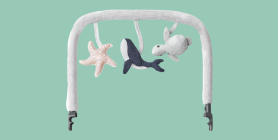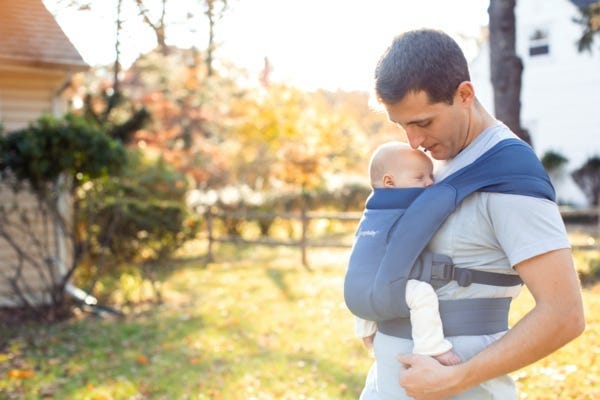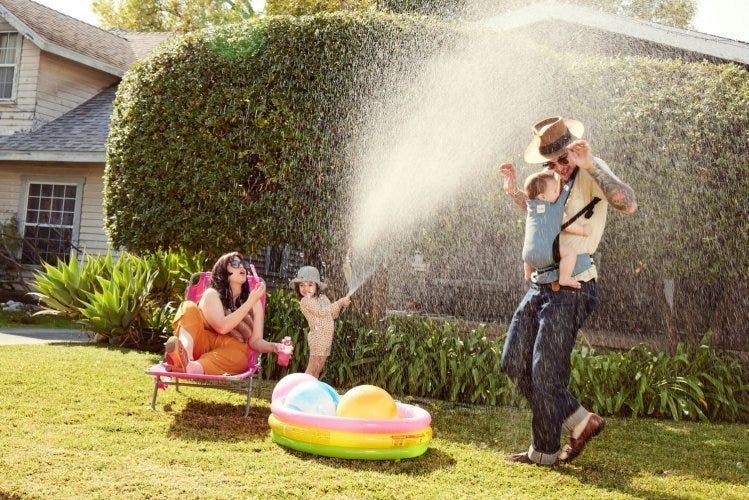La Leche League’s “Big Latch On” event, August 6th, 2011 “Women were ready to take charge of their own bodies. There was a need.” This was her answer when one founder was asked why they started La Leche League International (LLLI). In 1956, seven women founded La Leche League International united by a common bond: their mutual appreciation for natural birth and their healthy, happy breastfeeding babies. They nurtured, nursed and practiced what they preached, with a combined total of 63 children, 161 grandchildren, and 30 great grandchildren, as of 2008. They were encouraged by enthusiastic husbands, and inspired by their enjoyment to share what they knew with other mothers, in their Elmhurst, Illinois vicinity, who were often asking for guidance on how best to breastfeed their babies. In the words of each of the seven founders, here are some of their thoughts and history from their journey together. Their detailed chronological history as an organization, photos, and wonder-filled full biographical stories can be seen at the La Leche League International website: http://www.llli.org/docs/founders_bio1.pdf Mary Ann Kerwin, “In 1956, breastfeeding was a lost and dying art. I believe that never before in the history of the world had a resource as valuable as human milk been so widely discarded.” 80% of U.S. mothers were using infant formula, which became a trend in developing countries as more mothers abandoned breastfeeding. At age 55, Mary Ann became a lawyer to provide for the protection and rights of families. This has allowed her to serve in court cases as an expert witness on breastfeeding issues, and to promote breastfeeding in Colorado’s legislation, in her home state. Viola Brennan Lennon was feeling worn down in her sixth pregnancy when the doctor announced she was fine; she was simply “having twins!” She said, “Sixteen bottles in the fridge was a scary idea,” so she decided to breastfeed, and found, “Over the long run, it was easier.” This fit her philosophy of ‘doing things naturally.’ “I feel that breastfeeding gives the mother a vision of what a human person is. Personally, it led me to self-discovery and to a greater appreciation of the full humanity of the babies who were entrusted to me. Each woman needs to trust her own instincts, her own feelings, and her own sense of what will work for her with each baby.” “Childbirth Without Fear,” a book by Grantly Dick-Read, was credited as a powerful and supportive influence for many of the founders. Dr. Dick-Read was quoted for years by La Leche League saying, “The newborn has but three demands: warmth in the arms of its mother, food from her breast, and security in the knowledge of her presence—breastfeeding satisfies all three.” In 1957, Dr. Dick-Read was brought in by the La Leche League founders to speak to a packed high school auditorium as a childbirth expert. Betty Wagner Spandikow was the only breastfeeding mother in her doctor’s practice. She acted as Treasurer and handled business aspects when LLLI first began. Her contribution initiating flex hours, a family-friendly workplace and office hours that allowed working mothers to be home with their children after school, 7am – 3pm, were welcome and new in the 1960s. The La Leche League tradition was established to take an entire week off at the holidays for quality family time. Her innovative ideas for home offices and work teams provided the structure and flexibility that allowed mothers and families to thrive within their growing organization. Betty preferred to hire mothers, as she said, “Mothers know how to manage their time, how to manage money, and how to work hard!” Betty retired as Executive Director of LLLI at the age of 70. Edwina Hearn Froehlich shares her inspiration, “I knew what it had meant to me to be able to share my feelings with another mother. Women wanted to know how to breastfeed their babies but the majority of physicians couldn’t help them. Their expertise was formula feeding.” Neighborhood groups popped up and filled the need, mushrooming quickly as word spread. The foundation of their success was helping mothers to understand that breastfeeding is “a mothering issue most often, and not a medical problem.” In 2006, Edwina Froehlich was 91 years old, and still very active. An interesting fact: Edwina gave birth to three babies when she was between 36 and 42 years old, despite dire warnings against homebirth, or birth, at all, at her “advanced age” of 36, and with doubtful breastfeeding prospects for her “aged breasts.” Always being the pioneer Spirit, Edwina happily breastfed all three of her sons successfully, after they were each born, in turn, at home! Mary White, mother of eleven children, had six children at home, and was pregnant with her seventh child at their first meeting. Her husband, Dr. Greg White, appreciated his mentor’s philosophy of living according to “Mother Nature,” which, in turn, strongly influenced La Leche League’s philosophy. Mary has said, “The three main obstacles to successful breastfeeding were doctors, hospitals, and social pressures. Women had forgotten the wisdom of previous generations. By the time the La Leche League came along, mothers did not have the support of family and friends, let alone doctors, nurses, and hospitals. Mothers who tried to breastfeed in the 1950s were almost destined to fail.” Mary Ann Cahill echoed this sentiment, “The main challenge was women’s attitude toward breastfeeding. Women would ask us, “Why would you want to do that (breastfeed)?…There was a strong negative societal environment related to breastfeeding. We trusted our instincts and followed our hearts, and very soon we knew we were right!” Mary Ann had a philosophy that parenting was “people building.” “We were idealists and dreamers, as are all parents of young children to some extent. The hopes and dreams, the prayers and hard work of ‘people building’ are well worth the effort. I can’t imagine a more satisfying life.” Marian Leonard Tompson, “The best gift you can give your grandchildren is mothering your children.” Marian brought her many gifts to all children through La Leche League. She acted as President the first 24 years, tackling obstacles such as environmental contamination of human milk, lack of workplace support for mothers, medicated childbirth, and long term support needs for breastfeeding mothers. She loved to learn the most accurate scientific information to dissolve any challenge a mother may have had in breastfeeding successfully. She started the first newsletter publication in 1958, which grew, and is now a glossy magazine called New Beginnings. She started the Breastfeeding Seminar for Physicians to educate and keep doctors informed, so they could help breastfeeding mothers. Marian said that it was unfair women couldn’t get the help they wanted to breastfeed and do the best for their babies, and she asked if she and Mary (White) could do something about this. This is the seed of an idea that became the global family tree of La Leche League International. How we feed children, how they are born into the world, how they are carried, and related with has significant lifelong effects. The strength of La Leche League International’s success is rooted in the simple fact that primal nutrition is intended by nature to be breast milk, with its attendant bonding, nurturing and comforting connection human to human, mother to child. There is further scientific support for breastfeeding in the following definitions. “The Primal Health Research Institute proposes the following practical vocabulary adapted to the new scientific context: Primal - first in time and first in importance. Primal period - the time from conception to the first birthday. It is during this primal period that the adaptive systems involved in what we commonly call "health" reach maturity. It is the time of close dependence on the mother. One can anticipate that any kind of event happening during this period can have irreversible effects.” Being given lifeless infant formula over breast milk is an “event” countless babies will avoid thanks to La Leche League International’s on-going support & dedication to healthy families. The collective legacy of these seven women founders ignited a global movement, and includes more than they ever imagined sitting at their kitchen tables in 1956. Their devotion and vision are responsible for steering mothers back on track to natural births and breastfeeding, reversing a disempowering social trend by educating mothers, overcoming existing prejudices and false ideas, while expanding over the past 55 years into a successful publications business. Together, they co-authored the book, The Womanly Art of Breastfeeding, first published in 1958, now in its eighth edition. Also, La Leche League International is recognized by the Accreditation Council for Continuing Medical Education (ACCME) and accredited to provide continuing education credits to health professionals. When the La Leche League began, it quickly expanded into two groups, and then the organization ballooned into hundreds, then thousands of breastfeeding mother volunteers, who eventually spread across every U.S. State, Canada and 67 countries worldwide. The founders’ inspired wisdom in 1956 is now affirmed by mothers and healthy babies worldwide, as well as Dr. Michel Odent, the Director of the Primal Health Research Centre in London. Dr. Odent writes, “We are suddenly realizing that there are limits to our domination of nature. We understand the need to create unity within our planetary village. At this turning point in history, humanity must invent radically new strategies for survival. In order to succeed we need more that ever the energies of love. This is why the cultural negative conditioning that has interfered with physiological processes for thousands of years is rapidly losing its evolutionary advantages. As a result, we have new reasons to rediscover the basic needs of laboring women and newborn babies.” Breastfeeding is a primal way we engage, connect and meet our basic needs to the greatest advantage for our survival and future thriving.
Links: La Leche League’s “Big Latch On” event, August 6th, 2011: http://www.lllusa.org/wbw/BigLatchOn.php La Leche League’s World Breastfeeding Week: www.lllusa.org/wbw Dr. Michael Odent writes the newsletter, Primal Health Research. His essays “on the primal origins of health and disease are of unique importance in the field of prenatal and perinatal psychology and health, and give substance to an urgent new branch of studies affecting all future families.” Please visit www.birthpsychology.com for further information and excellent essays. Vocabulary: (Odent (1986), Primal Health. London: Century-Hutchinson). http://birthpsychology.com/free-article/primal-health-essays-michel-odent-md
Emotional Benefits of Getting Outside
Spending time in nature with your baby can strengthen the bond between you. The simple act of holding your baby close, feeling their warmth, and sharing new experiences together can create strong emotional connections. It’s also a wonderful way to reduce stress and improve your mood. When my littles were extra fussy, I’d take a walk around the neighborhood. Even though I don't live in an area with trails and surrounded by nature, simply behind outside changed everything. A little vitamin D does wonders!
Cognitive Development
Nature is a sensory wonderland for babies. The different sights, sounds, and smells can stimulate your baby’s senses and promote cognitive development. Watching leaves rustle, hearing birds chirp, and feeling the texture of a tree bark can all contribute to their learning and development.
All About Baby Carriers for Nature Adventures
Choosing the Right Baby Carrier
When it comes to selecting the best baby carrier for summer adventures, there are several options to consider.
Types of Baby Carriers:
- Wraps: Perfect for newborns, providing a snug and secure fit.
- Slings: Ideal for quick and easy use, offering good ventilation.
- Soft Structured Carriers: Versatile and comfortable for both parent and baby, suitable for longer trips.
Factors to Consider:
- Baby’s Age and Weight: Ensure the carrier is appropriate for your baby’s size and weight. For example, Ergobaby’s Embrace Newborn Carrier is perfect for the fourth trimester where baby is small and you’re looking for an easy way to stay close. As they grow, you’ll want to upgrade to an all-position carrier that’s meant for growing babies.
- Parent’s Comfort and Ergonomics: Look for carriers with padded shoulder straps and lumbar support if you’re planning on longer outings.
- Ease of Use: Choose a carrier that is easy to put on and take off.
- Climate and Breathability: Opt for carriers made of breathable fabrics to keep you and your baby cool in hot weather.
Safety Tips:
- Proper Positioning: Ensure your baby is seated correctly, with their legs in an "M" position and their head should be close enough to kiss.
- Checking for Wear and Tear: Regularly inspect your carrier for any signs of damage.
- Ensuring Adequate Support: Make sure the carrier provides proper support for your baby’s head and neck.
Exploring Nature with a Baby Carrier
Ideal Spots for a Nature Walk with Baby
- Parks and Gardens: Great for leisurely walks and picnics.
- Nature Trails and Forests: Perfect for more adventurous outings.
- Beaches and Lakesides: Wonderful for enjoying the water and sand, with the right carrier.
Activity Ideas
- Hiking: Enjoy a scenic hike with a hiking baby carrier that offers support and storage.
- Bird Watching: Use your carrier to keep your baby close while you explore and observe wildlife.
- Picnics: A carrier can free up your hands, making it easier to carry picnic supplies.
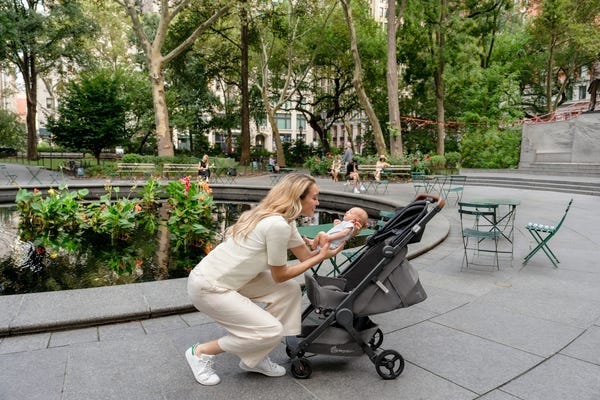

Advantages of Using Strollers for Nature Adventures
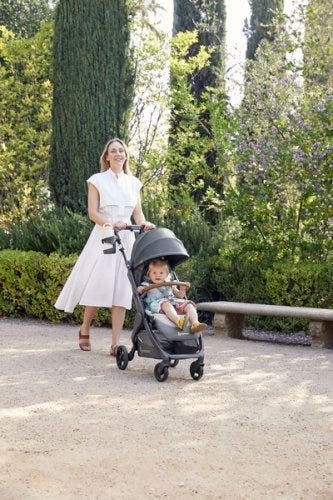

While baby carriers are fantastic for mobility and closeness, depending on the adventure of choice you might want to be a stroller along too.
There are a LOT of baby stroller options on the market. So we understand how confusing it can be to choose the one that’s right for your family. Not only are there a variety of brands, but a variety of strollers that serve different purposes.
There are a few types of strollers on the market:
- Full-sized stroller: This is typically the stroller parents thing of buying for all its versatility.
- Lightweight or umbrella stroller:These compact strollers are perfect for on-the-go adventures.
- Jogging stroller: Designed for parents who want to combine fitness with outdoor adventures.
- Double stroller: Designed for parents with multiple kids, especially twins.
- Car seat carrier: These strollers connect to a specific car seat. We don't typically recommend these as they can be unsafe for baby and uncomfortable for parents who are pushing.
Learn more about the types of strollers and which one would be best for you.
Benefits of Bringing a Stroller
- Storage Space for Gear: Ample room for carrying all your essentials like a diaper bag, beach toys and more.
- Shade and Weather Protection: Built-in canopies to shield your baby from the sun when they are lounging.
- Options: If you have more than one kid, you can stroll with one and carry the other. Or, if you’re getting warm or your little one is getting fussy, you can switch up their position from stroller to carrier or vice versa.
Safety Tips for Strollers
- Ensure your stroller is in good working condition. Make sure buckles are still buckling and that there are no rips or holes that could compromise your baby’s safety.
- Use sunshades or bug nets to protect your little one’s skin.
- Securing the baby properly: always buckle up your baby for safety even if you think they are old enough to go without the buckle.
Combining Baby Carriers and Strollers
For the ultimate flexibility, consider using both a baby carrier and a stroller on your outings.
Combining both options allows you to adapt to different situations. Use the carrier for more rugged trails and switch to the stroller for smoother paths or when your baby needs a nap.
Transition Tips
- Smooth Transitions: Plan stops where you can easily switch from carrier to stroller.
- Pack Light: Only bring essentials to make transitions easier.
Tips for a Successful Adventure
Planning Ahead
- Route Planning: Choose baby-friendly trails and parks. Check local mom groups or outdoor groups and get recommendations for the best outings for kids.
- Check Weather Conditions: Avoid extreme heat or unpredictable weather. Even with our most breathable carriers, when it’s hot, it’s hot. And having two bodies against each other in the heat will be naturally hot and sticky already.
- Packing Checklist: Include diapers, snacks, water, sunscreen, and a first-aid kit. These all-position carriers have storage pockets where you can fit some of the items easily!
- Stay Hydrated and Nourished: Pack healthy snacks to keep energy levels up and bring plenty of water for both you and baby.
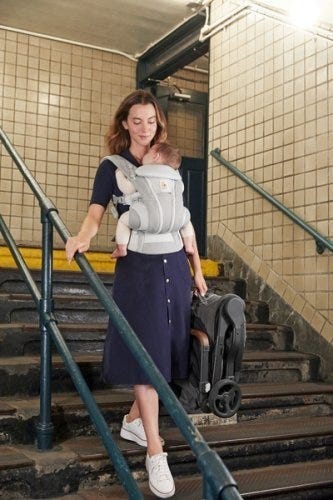

Summer adventures with your baby are a wonderful way to create lasting memories and enjoy the beauty of nature together. From baby carriers to strollers, Ergobaby products are designed to provide comfort and ease for both you and your little one. So, gear up, get outside, and explore the world with your baby by your side.
Ready to embark on your own summer adventures? Check out Ergobaby’s range of baby carriers and strollers to find the perfect match for your family’s needs. Visit our website today and start planning your next outdoor excursion!
















